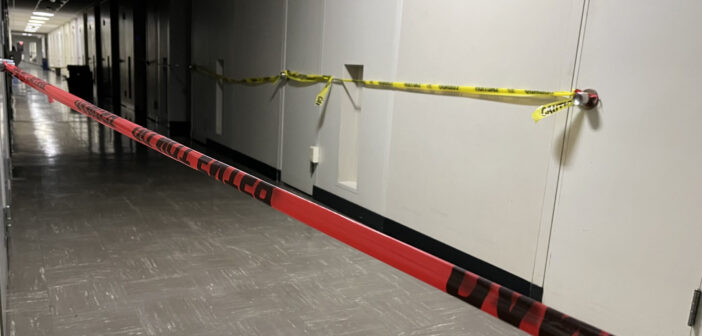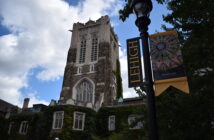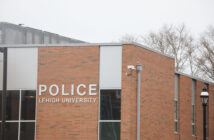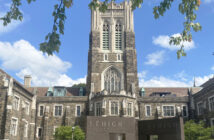Update (Nov. 15): After a small amount of mercury was found in a room on the first floor of Iacocca Hall in the C-Wing, the risk of exposure to Mercury was deemed low, according to a HawkWatch alert sent to the campus community Wednesday, Nov. 8, by Jason Schiffer, the assistant vice president of campus safety.
He wrote all mercury that is or was present has been contained or removed according to air quality test results that tested below requirements from the Occupational Safety and Health Administration and the National Institute for Occupational Safety & Health.
Certain rooms on floors 1 through 3 of the C-wing will remain closed until they receive the final analysis of swab testing from the Environmental Health & Safety Department. At this time, Schiffer wrote test results indicate there is no risk of exposure in other areas of the building.
Students who were present in the C-wing before the discovery and staff who were involved in the discovery were initially considered to be at risk for acute or chronic exposure and were given specific resources and tests for mercury exposure, but results indicated testing is not recommended.
Schiffer wrote that there will continue to be updates with more information and results.
Original story: A small amount of mercury was found in a room on the first floor of Iacocca Hall in the C-Wing, according to a HawkWatch alert sent to the campus community Wednesday, Nov. 8 by Jason Schiffer, the assistant vice president of campus safety.
Facilities personnel are following “all recommended practices regarding remediation,” Schiffer wrote, and an outside company is performing the remediation and air quality testing.
According to the United States Environmental Protection Agency, the health effects of mercury exposure may not occur at all or can be very severe, depending on factors such as the people involved and the circumstances surrounding the exposure.
All lab classes in that area were canceled for the day, and Schiffer wrote that people should avoid the sectioned-off area, including the first, second and third floors of the C-Wing, until further notice.
Randy Shebby, the interim director of Environmental Health & Safety, wrote to The Brown and White that maintenance technicians were notified about and began to fix an overflowing sink in the lab when they “noticed what appeared to be mercury in the bottom of the wet vac they used to clear out the sink.”
He wrote that the test only determined mercury was present, but further detailed testing is necessary to obtain precise measurements. No other contaminants were identified.
Zoe Broker, ’26, was getting water outside her class when she returned and found her lab was blocked off. She said personnel there identified “high levels” of mercury brought to their attention by flooding from the previous day.
She said a graduate student in her class mentioned the mercury could have been present for years but was only discovered after the flood.
“I’m very uncertain of how long we’re going to be out of our research labs,” Broker said. “It’s making me a little bit nervous because I know I had to stop in the middle of my experiment to leave and these experiments are time-sensitive.”
Petra Oganovich, ’26, works on the floor where the mercury was discovered and received a text message from Broker about the evacuation.
Oganovich also received an email from the Environmental Health & Safety department notifying her that her lab would be temporarily shut down, though the lecture component of her class would continue over Zoom.
“It’s definitely a bit of a shocker, and I’m worried,” Oganovich said. “Have we been exposed to mercury this whole time taking this class? Because that’s obviously pretty dangerous and can have long-term effects. I hope that they are going to be pretty transparent about it, but I don’t know.”
Shebby wrote that there are no immediate safety concerns for students, faculty and staff.
“Any plans to address health concerns will be informed by the findings of the investigation and remediation efforts,” Shebby wrote.






Comment policy
Comments posted to The Brown and White website are reviewed by a moderator before being approved. Incendiary speech or harassing language, including comments targeted at individuals, may be deemed unacceptable and not published. Spam and other soliciting will also be declined.
The Brown and White also reserves the right to not publish entirely anonymous comments.